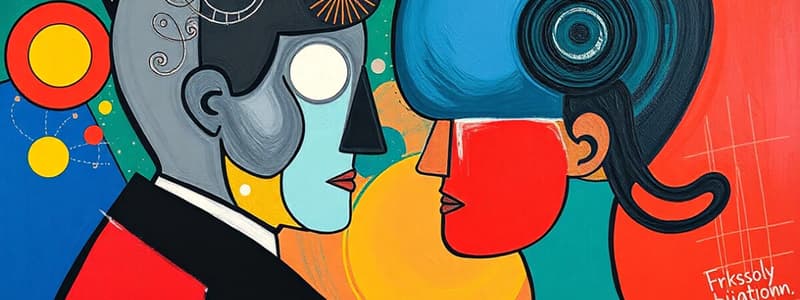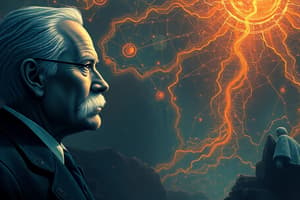Podcast
Questions and Answers
According to Freud's psychoanalytic theory, which component of the personality operates on the pleasure principle, seeking immediate gratification of needs?
According to Freud's psychoanalytic theory, which component of the personality operates on the pleasure principle, seeking immediate gratification of needs?
- Conscious
- Superego
- Id (correct)
- Ego
According to Erikson's psychosocial theory, what is the primary conflict faced during adolescence?
According to Erikson's psychosocial theory, what is the primary conflict faced during adolescence?
- Identity vs. Role Confusion (correct)
- Generativity vs. Stagnation
- Industry vs. Inferiority
- Intimacy vs. Isolation
In classical conditioning, what term is used to describe a previously neutral stimulus that, after becoming associated with an unconditioned stimulus, eventually triggers a conditioned response?
In classical conditioning, what term is used to describe a previously neutral stimulus that, after becoming associated with an unconditioned stimulus, eventually triggers a conditioned response?
- Conditioned Stimulus (correct)
- Reflexive Stimulus
- Unconditioned Stimulus
- Neutral Response
In operant conditioning, what is the process of removing a stimulus to decrease the likelihood of a behavior?
In operant conditioning, what is the process of removing a stimulus to decrease the likelihood of a behavior?
According to Bandura's social learning theory, what is the term for an individual's belief in their capacity to execute behaviors necessary to produce specific performance attainments?
According to Bandura's social learning theory, what is the term for an individual's belief in their capacity to execute behaviors necessary to produce specific performance attainments?
According to Piaget's stages of cognitive development, during which stage do children begin to think logically about concrete events but still struggle with abstract or hypothetical concepts?
According to Piaget's stages of cognitive development, during which stage do children begin to think logically about concrete events but still struggle with abstract or hypothetical concepts?
Within the information processing theory, which type of memory briefly holds sensory information before it is further processed?
Within the information processing theory, which type of memory briefly holds sensory information before it is further processed?
In Bronfenbrenner's ecological systems theory, which system involves the interactions between different microsystems in a person's life?
In Bronfenbrenner's ecological systems theory, which system involves the interactions between different microsystems in a person's life?
According to dynamic systems theory, what describes the emergence of organized patterns of behavior from the interaction of multiple components without explicit instruction?
According to dynamic systems theory, what describes the emergence of organized patterns of behavior from the interaction of multiple components without explicit instruction?
Which evolutionary theory suggests that infants have an innate need to form close bonds with their caregivers for survival and well-being?
Which evolutionary theory suggests that infants have an innate need to form close bonds with their caregivers for survival and well-being?
Flashcards
Freud's Psychoanalytic Theory
Freud's Psychoanalytic Theory
Unconscious drives and motives underlie behavior; development occurs in psychosexual stages (oral, anal, phallic, latency, genital). Early experiences shape personality.
Erikson's Psychosocial Theory
Erikson's Psychosocial Theory
Development occurs across eight psychosocial stages, each with a crisis to resolve for healthy development. Stages span lifespan.
Classical Conditioning
Classical Conditioning
Learning through association; a neutral stimulus becomes associated with a meaningful stimulus, eliciting a similar response.
Operant Conditioning
Operant Conditioning
Signup and view all the flashcards
Social Learning Theory
Social Learning Theory
Signup and view all the flashcards
Piaget's Cognitive Theory
Piaget's Cognitive Theory
Signup and view all the flashcards
Information-Processing Theory
Information-Processing Theory
Signup and view all the flashcards
Ecological Systems Theory
Ecological Systems Theory
Signup and view all the flashcards
Dynamic Systems Theory
Dynamic Systems Theory
Signup and view all the flashcards
Evolutionary Theories
Evolutionary Theories
Signup and view all the flashcards
Study Notes
- Developmental theories provide frameworks for understanding human growth, change, and consistency across the lifespan.
- Theories help organize observations and guide research.
Psychoanalytic Theories - Freud
- Sigmund Freud's psychoanalytic theory posits that unconscious drives and motives underlie human behavior.
- Freud proposed a psychosexual theory where development occurs in stages (oral, anal, phallic, latency, and genital), each focused on a particular erogenous zone.
- Fixation at any stage could lead to specific personality traits in adulthood.
- The Oedipus complex (during the phallic stage) involves a child's unconscious desire for the opposite-sex parent and rivalry with the same-sex parent.
- Freud's theory emphasizes the importance of early childhood experiences in shaping personality.
- Key concepts include the id (primitive instincts), ego (the rational self), and superego (the moral conscience).
Psychoanalytic Theories - Erikson
- Erik Erikson expanded on Freud's ideas with his psychosocial theory, emphasizing social and cultural influences on development.
- Erikson proposed eight stages of development, each characterized by a specific psychosocial crisis.
- Stages span the entire lifespan, unlike Freud's theory, which focuses on childhood.
- Each stage presents a challenge or crisis that must be resolved for healthy development.
- Stage 1: Trust vs. Mistrust (infancy): Infants learn to trust caregivers if their needs are consistently met.
- Stage 2: Autonomy vs. Shame and Doubt (early childhood): Children strive for independence.
- Stage 3: Initiative vs. Guilt (preschool years): Children learn to initiate activities and assert themselves.
- Stage 4: Industry vs. Inferiority (school age): Children develop competence and a sense of achievement.
- Stage 5: Identity vs. Role Confusion (adolescence): Adolescents explore their identity and values.
- Stage 6: Intimacy vs. Isolation (young adulthood): Young adults seek close relationships and connection.
- Stage 7: Generativity vs. Stagnation (middle adulthood): Adults contribute to society and support future generations.
- Stage 8: Integrity vs. Despair (late adulthood): Older adults reflect on their lives and seek a sense of fulfillment.
Behaviorism - Classical Conditioning
- Behaviorism emphasizes the role of learning in shaping behavior.
- Classical conditioning, pioneered by Ivan Pavlov, involves learning through association.
- A neutral stimulus becomes associated with a meaningful stimulus, eliciting a similar response.
- John B. Watson applied classical conditioning to human behavior, demonstrating that emotions could be learned through conditioning.
- Example: Pavlov's dog experiment, where a bell (neutral stimulus) was paired with food (meaningful stimulus) to elicit salivation (response).
Behaviorism - Operant Conditioning
- Operant conditioning, developed by B.F. Skinner, focuses on learning through consequences.
- Behaviors are strengthened by reinforcement and weakened by punishment.
- Positive reinforcement involves adding a desirable stimulus to increase a behavior.
- Negative reinforcement involves removing an undesirable stimulus to increase a behavior.
- Positive punishment involves adding an undesirable stimulus to decrease a behavior.
- Negative punishment involves removing a desirable stimulus to decrease a behavior.
- Example: Giving a child a treat for completing homework (positive reinforcement) or taking away screen time for misbehaving (negative punishment).
Social Learning Theory
- Social learning theory, proposed by Albert Bandura, emphasizes the role of observation and imitation in learning.
- People learn by observing others (models) and imitating their behavior, especially when the model is admired or successful.
- Observational learning involves attention, retention, reproduction, and motivation.
- Self-efficacy, the belief in one's ability to succeed in specific situations, plays a crucial role in social learning.
- Example: A child learning to play a sport by watching and imitating a professional athlete.
Cognitive Theories - Piaget
- Jean Piaget's cognitive theory focuses on how thinking changes as people develop.
- Piaget proposed that children progress through four stages of cognitive development: sensorimotor, preoperational, concrete operational, and formal operational.
- Sensorimotor stage (0-2 years): Infants learn through sensory experiences and motor actions.
- Preoperational stage (2-7 years): Children develop symbolic thinking and language but struggle with logic and perspective-taking.
- Concrete operational stage (7-11 years): Children develop logical thinking about concrete objects and events.
- Formal operational stage (11+ years): Adolescents develop abstract and hypothetical thinking.
- Key concepts include schemas (mental frameworks for organizing knowledge), assimilation (fitting new information into existing schemas), and accommodation (adjusting schemas to fit new information).
Cognitive Theories - Information Processing
- Information-processing theory views the human mind as a computer, focusing on how information is encoded, stored, and retrieved.
- Development involves improvements in attention, memory, and problem-solving skills.
- Sensory memory, working memory, and long-term memory are key components of the information-processing system.
- Executive functions, such as planning and decision-making, become more sophisticated with age.
Systems Theories - Ecological Systems
- Urie Bronfenbrenner's ecological systems theory emphasizes the multiple levels of environmental influence on development.
- The microsystem includes immediate environments such as family, school, and peer group.
- The mesosystem involves interactions between microsystems, such as the relationship between home and school.
- The exosystem includes external settings that indirectly influence development, such as parents' workplaces.
- The macrosystem represents cultural values, laws, and customs.
- The chronosystem involves historical changes and transitions over the lifespan.
Systems Theories - Dynamic Systems
- Dynamic systems theory emphasizes the ongoing interaction between a person's physical, cognitive, and social-emotional development, as well as their environment.
- Development is viewed as a complex, dynamic process involving constant change and adaptation.
- Change in one area of development can influence other areas.
- Self-organization is a key concept, where patterns of behavior emerge from the interaction of multiple factors.
- Example: A child learning to walk involves the interaction of muscle strength, balance, motivation, and environmental support.
Evolutionary Theories
- Evolutionary theories emphasize the role of genetics and adaptation in human development.
- Charles Darwin's theory of natural selection suggests that traits that enhance survival and reproduction are more likely to be passed on to future generations.
- Ethology, the study of animal behavior, has informed evolutionary perspectives on human development.
- Attachment theory, developed by John Bowlby, suggests that infants have an innate need to form close bonds with caregivers for survival and well-being.
- Evolutionary psychology applies evolutionary principles to understand human behavior, including social behavior, mate selection, and parenting.
Studying That Suits You
Use AI to generate personalized quizzes and flashcards to suit your learning preferences.




